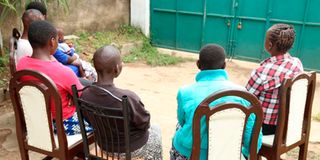Support those who operate shelters and safe spaces for SGBV survivors

Some of the girls rescued and hosted at the Community Forum for Advanced Sustainable Development - a safe house in Kisumu, on July 16, 2020.
That reports on sexual and gender-based violence (SGBV) against girls and women keep coming in constantly, from different parts of the country, at a time when advocacy against the crime is at its peak, is not only frustrating and heartbreaking but also most egregious.
For instance, even before the nation has fully recovered from the shock of a sexual attack in Nairobi by boda boda riders and other men on a woman motorist, a similar assault—by yet another rider—occurred last week. This time, the thug took his helpless pillion passenger to a forest in the wee hours of the night and raped and abandoned her!
Thankfully, the main suspect was arrested and, if convicted, should rot in jail. However, the damage, including the trauma he has caused the woman will forever live with her.
There have been, in the same week, other reported cases of SGBV, which remains a serious protection issue, principally for girls and women. Among these are two fatal ones whereby a man, also in Nairobi, poisoned his wife and her friend while another hacked his partner to death over domestic issues.
Gender-based attacks
Sadly, these are just a fraction of gender-based attacks and assaults that are reported in the media, with women as mostly the victims. It is a sorry state of affairs that calls for collectivity and seriousness in addressing—and especially preventing them.
It is for a related reason that the country owes a lot to a certain rare group of Kenyans. Although they play a fundamental role of rescuing and caring for survivors of SGBV—girls, women and even boys—they seldom get acknowledged and supported.
They operate safe houses and spaces that give shelter and solace to survivors of all forms of SGBV and violations including sexual rape and defilement, incest, child and forced labour as well as human trafficking.
This group, comprising individuals and organisations from different parts of the country, came together last Thursday to launch The National Shelters Network Kenya (NSN). For now, NSN has 55 shelters spread across 18 counties. None is run by the government.
While these shelter operators have a similar objective—to help victims of human rights violations regain their dignity to lead normal lives—one cannot fail to figure out how close they are to desperation in getting assistance, financial and otherwise, to do their work.
Child mothers
Some of the survivors are children as young as 10 who are already mothers! It is quite harrowing to listen to stories of these child mothers who have not only been uprooted from their families but are also forced to take up responsibilities of motherhood at that tender age.
One cannot also help but marvel at—nay, get inspired by—the audacity of most of these operatives and the extent to which they go to help these Kenyans in vulnerable situations. Instead of sitting back to lament and whine about the challenges they face, those who operate shelters for girls, women and even boys whose human rights are violated and need safe accommodation have resolved to collectively build links with the relevant state and non-state players.
They hope to be able to advocate guidelines and standards for registration of shelter operations as well as mobilisation of resources. In addition, and most fundamental, is to jointly, and in a coordinated manner, campaign for policy change in relation to protection mechanisms and related services for survivors of SGBV—especially vulnerable women and girls, the main victims of these violations.
It behoves the government to work with those who provide safe spaces and solace to survivors of SGBV and other vulnerable people to address the gaps in law, policy and other opportunities, including resources and capacity building, to help in addressing the relevant issues, including prevention.
It is imperative, for instance, that the government moves to ensure a clear registration regime as lack of clarity only helps to undermine provision of shelter services yet the Constitution obligates the state to, among other interventions, address the needs of vulnerable groups in the society.
Ms Rugene, a consulting editor, is the founder of The Woman’s Newsroom Foundation. [email protected].





